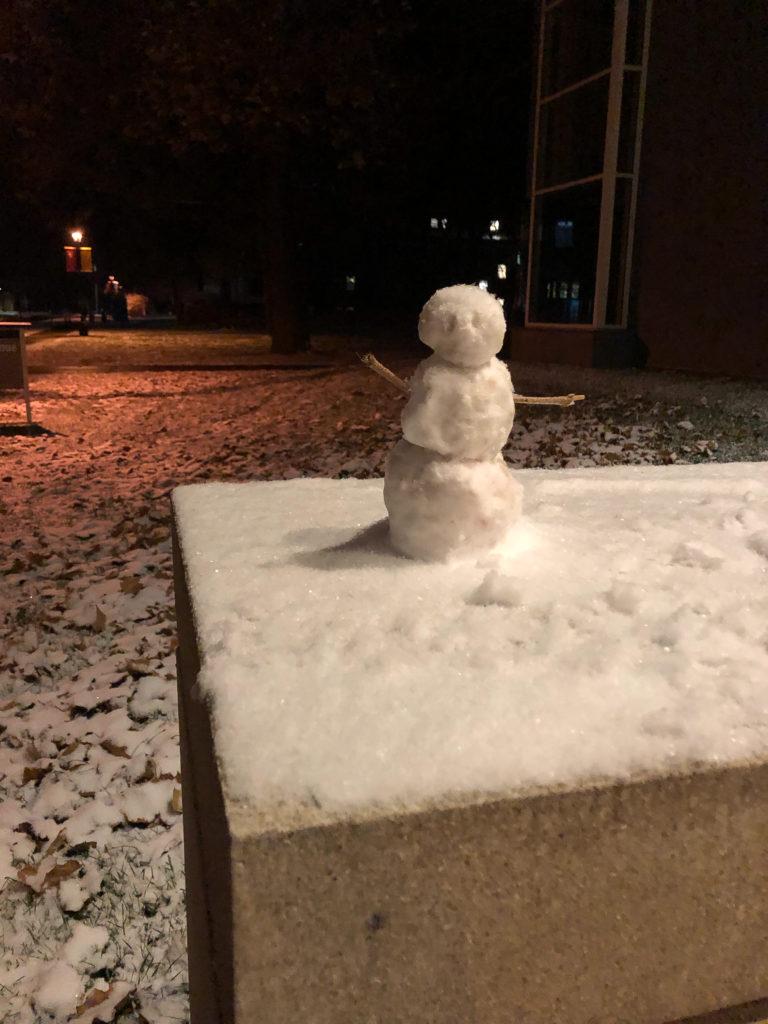By Kelly Page
pagekell@grinnell.edu
Winter can have a negative effect on people’s emotional wellbeing and mental health.
Lucky Resch ‘19 started experiencing symptoms of seasonal affective disorder when they moved from their home in the California Bay Area to Grinnell.
“I’m diagnosed with seasonal affective disorder, so I experience an increase in my depressive symptoms, my anxiety; I can tend to have a lower energy level, and these things are all really weird because I think there’s a way in which Iowa winter is really beautiful even though it’s simultaneously kind of painful and hard for me to go through,” said Resch.
Zoë Whittle ‘21, a Santa Fe, New Mexico native, echoed a similar sentiment. “I definitely get worse seasonal depression here than I did back home, which makes it harder to get out of bed, harder to go to class, harder to do anything.”
For Antonix Davis ‘21, who grew up in Texas, not having prior knowledge of the realities of winter caught them off-guard when temperatures fell their first year, which made it difficult for them to function.
“Even though I logically knew that temperatures could get below 30 degrees, actually experiencing those temperatures was almost too much for me … I fell further into depression, lost interest in basically everything, and even stopped hanging out with my friends as much,” wrote Davis in an email to The S&B.
Although winter can have a negative effect on anyone, dealing with seasonal affective disorder presents its own unique problems that those without the disorder do not experience.
Resch cautioned students away from using the label of seasonal affective disorder when they do not actually suffer from it. “I think it’s important to leave the actual label to those who have sought diagnosis or intend to. On the flipside, it is very valid for winter to be vaguely difficult for anyone, and accepting the validity of that helps both those people and the diagnosed,” they said.
Gina Liddell-Westefeld, a staff counselor at SHACS, outlined some coping skills that they might recommend to students struggling through the winter.
“I would first say that everyone’s different, so something that might work for one person might not work for another, but I think basic things are feeling like you’re getting support from other people or just having people that you feel connected to, being active, trying to get 20-30 minutes of sunlight a day. If it feels like counseling is possible, coming in for counseling, or talking to your physician about medication,” said Liddell-Westefeld.
Aside from seeking counselling at SHACS, students are able to use the Wellness Lounge, located on the west side of the second floor of the Joe Rosenfield Center. It can be a cozy space for students to focus on their wellbeing using tools like a happy lamp, a light fixture intended to replicate sunlight and ease some of the strain of winter darkness. There is also a weekly Tea Time in the Wellness Lounge on Tuesdays from 7 to 9 p.m., where students can relax together and seek connections to mental health resources.
“I think it’s nice because the Wellness Lounge is a very accessible area for students. It’s not even a particular room, just a place that people kind of stumble upon, and you never feel too disconnected from campus. It’s just a little oasis,” said Emma Olson ‘19, a board member of the Wellness Lounge.
Olson, who is from Minnesota, pointed out the importance of helping friends who are less familiar with the winter.
“I think make sure to check in with friends that maybe haven’t had to deal with this before and they don’t know or understand that this is something that is very normal. Be like, ‘let’s find fun winter activities to do. Like sledding is really cool! It’s cold, but it’s fun.’ Trying to find those good points in the winter months can make it easier to get through,” she said.
Resch uses a happy lamp to deal with their seasonal affective disorder symptoms, saying “It’s not a cure-all, but it definitely helps.” They also try to combat their deficiency of vitamin D through supplements and diet, which helps alleviate some of their symptoms, and work to maintain a healthy sleep schedule to make sure that they are exposed to light as much as possible.
“I think [winter’s] negative impacts on me are primary, but one of the things that I think is interesting that is more positive is that I do get more focused on the people around me and my schoolwork because there’s almost a limiting of physical spaces that I can be in,” Resch said.
They added, “Snow is so pretty, and it lets me live in the picture of winter that you’re fed as a child in California.”
Davis says that along with their coping skills of deep breathing strategies and reading books, their friends have helped them combat winter depression.
“Because my attachments to people grew stronger, I feel more motivated to get out of bed when necessary and go eat with others. When I don’t feel motivated to take care of my health, oftentimes my friends will intervene by doing things such as bringing me food, dragging me to the Grille, or just coming to be present and in the moment with me,” they wrote.
In the Netherlands, people deal with the brutal winter months by embracing “hygge,” a feeling of coziness and closeness to others that helps the country remain one of the happiest in the world. In Norway and Sweden, locals keep with the philosophy of “friluftsliv,” or “free air life,” staying happy in the winter by prioritizing their connection with nature. Loving nature and feeling the comfort of connection with others can be powerful tools in staving off the cold darkness.



































































